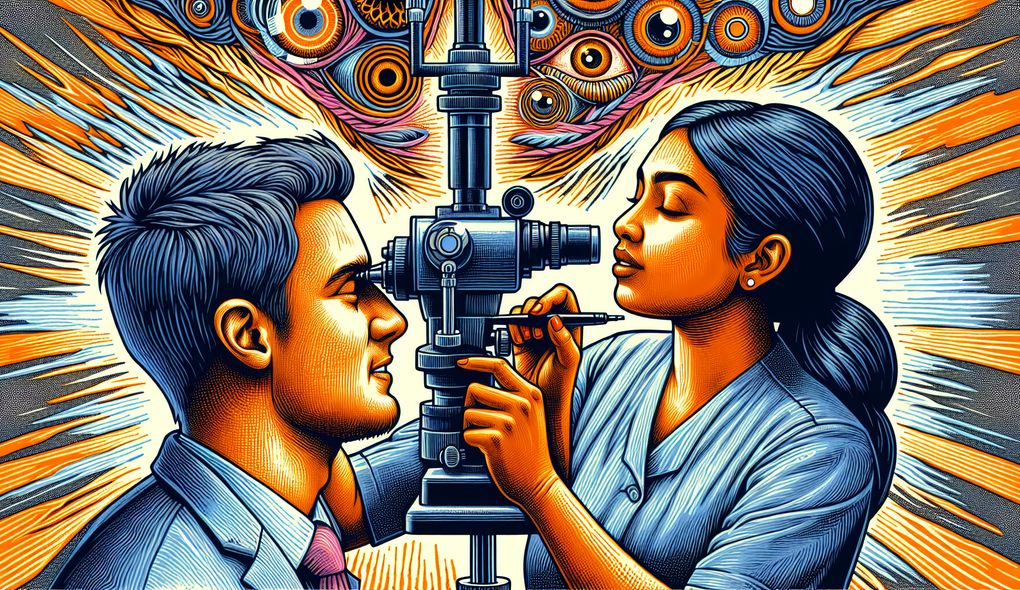Can you explain your process for prescribing medications for eye conditions?
INTERMEDIATE LEVEL

Sample answer to the question:
When prescribing medications for eye conditions, I follow a thorough process to ensure the safety and effectiveness of the treatment. First, I conduct a detailed eye examination to diagnose the specific condition and determine the appropriate medication. I review the patient's medical history, current medications, and any allergies to avoid potential interactions or adverse reactions. I also consider the patient's age, overall health, and lifestyle factors that may impact the treatment. Based on the diagnosis, I select the most suitable medication, taking into account the dosage, frequency, and duration of the treatment. I then explain the medication to the patient, including the purpose, potential side effects, and instructions for proper administration. Throughout the treatment, I closely monitor the patient's response and adjust the medication as needed. Communication and collaboration with ophthalmologists and other healthcare providers are essential in ensuring comprehensive care for the patient.
Here is a more solid answer:
Prescribing medications for eye conditions requires a comprehensive process that draws on my expertise in patient assessment, diagnostic skills, and ophthalmic knowledge. When a patient presents with an eye condition, I conduct a thorough examination to evaluate their visual acuity, ocular health, and specific symptoms. I utilize specialized tools and equipment to assess their eye conditions accurately. This assessment involves gathering information about their medical history, allergies, and current medications to ensure safe prescribing practices. Based on the examination findings, I make an accurate diagnosis and select the most appropriate medication and treatment plan. I consider factors such as the patient's age, overall health, and lifestyle to optimize treatment outcomes. I always prioritize patient education and provide detailed information about the medication, including potential side effects and proper administration techniques. Throughout the treatment process, I closely monitor the patient's progress, adjusting the medication as necessary. I collaborate closely with ophthalmologists and other healthcare team members to ensure a comprehensive approach to patient care and regularly update my knowledge on the latest advancements in ophthalmic treatments.
Why is this a more solid answer?
The solid answer expands on the basic answer by providing specific examples and details about the candidate's experience and expertise in patient assessment and diagnostic skills, knowledge of ophthalmic diseases and treatments, ability to work effectively in a fast-paced medical environment, communication and education skills, and collaborative skills. The answer also emphasizes the importance of patient education, monitoring, and collaboration.
An example of a exceptional answer:
Prescribing medications for eye conditions is a multifaceted process that requires a combination of clinical expertise, communication skills, and patient-centered care. As an experienced ophthalmology nurse practitioner, I approach medication prescribing with meticulous attention to detail and a comprehensive understanding of the patient's unique needs. Throughout my career, I have honed my patient assessment and diagnostic skills, enabling me to conduct thorough eye examinations and accurately diagnose various ocular conditions. I stay updated on the latest advancements in ophthalmology to ensure evidence-based practice and offer the most effective treatment options to my patients. Furthermore, I prioritize effective communication by explaining the medication treatment plan in a clear and concise manner, addressing any concerns or questions the patient may have. I also provide educational materials that empower patients to actively participate in their eye health. Collaboration is integral to my practice, and I work closely with ophthalmologists, optometrists, and other healthcare professionals to provide holistic and coordinated care. By evaluating the patient's overall health, considering their lifestyle, and reviewing their medical history, I tailor medication prescribing to ensure both safety and efficacy. Throughout the treatment process, I maintain open lines of communication with patients to monitor their response to medications and make any necessary adjustments. My commitment to excellence, continuous learning, and patient-centered care consistently results in positive outcomes for my patients.
Why is this an exceptional answer?
The exceptional answer provides a more detailed and personalized account of the candidate's expertise in patient assessment and diagnostic skills, knowledge of ophthalmic diseases and treatments, ability to work effectively in a fast-paced medical environment, communication and education skills, and collaborative skills. It highlights the candidate's commitment to continuous learning, evidence-based practice, and patient-centered care, leading to positive outcomes for patients.
How to prepare for this question:
- 1. Familiarize yourself with common ophthalmic diseases, treatments, and medications, including their indications, contraindications, dosages, and potential side effects.
- 2. Practice conducting thorough eye examinations, including visual acuity testing, slit-lamp microscopy, and other relevant assessments.
- 3. Stay updated on the latest advancements in ophthalmology by reading journals, attending conferences, and participating in continuing education courses.
- 4. Develop your communication and education skills by practicing explaining complex medical concepts to patients in a clear and understandable manner.
- 5. Enhance your collaborative skills by actively participating in interdisciplinary discussions and seeking opportunities to work with ophthalmologists and other healthcare professionals.
What are interviewers evaluating with this question?
- Excellent patient assessment and diagnostic skills
- Strong knowledge of ophthalmic diseases and treatments
- Ability to work effectively in a fast-paced medical environment
- Excellent communication and education skills
- Strong collaborative skills to work with a healthcare team

